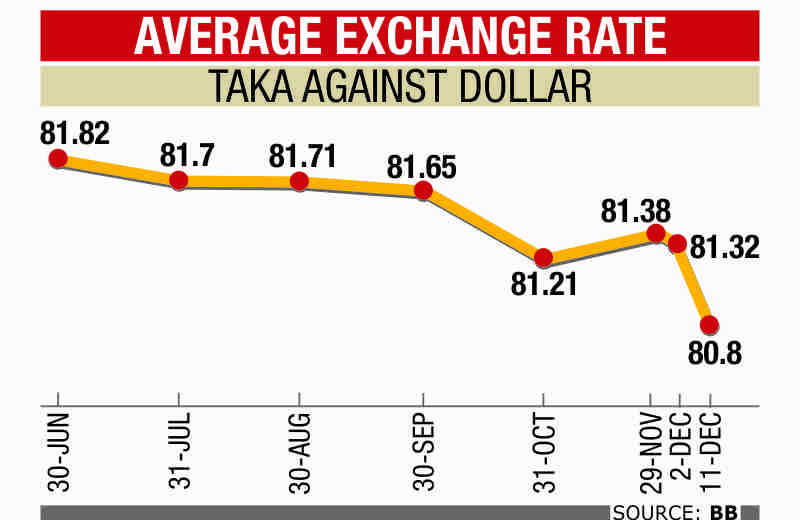BB buying dollar to keep rate stable
 The central bank is buying a large amount of dollars from the foreign exchange market almost every month to maintain stability of the exchange rate mainly because of a fall in import.
The central bank is buying a large amount of dollars from the foreign exchange market almost every month to maintain stability of the exchange rate mainly because of a fall in import.
A Bangladesh Bank official said the main target of the central bank is to ensure competitiveness of export commodities and to keep inflation under control.
The central bank has bought $1.82 billion from the forex market from July 1 to December 11. In the first 11 days of December, the amount was $107 million.
The BB is buying dollars in a way that does not fuel the appreciation of the taka against the dollar, said the official.
In the recent times, the taka has been appreciated continuously against the dollar. On December 11, the taka's weighted average rate against the dollar was Tk 80.80, down from Tk 81.32 on December 2.
The rates were Tk 81.38 on November 30 and Tk 81.82 on June 30.
Kazi Sayedur Rahman, general manager (forex reserve and treasury management department) of the central bank, said if the taka is appreciated much, export commodities may lose their competitiveness against the neighbouring countries.
He said the amount of foreign currency at banks often goes up beyond their limit as the demand for import is low now.
So the central bank buys the excess foreign currency from the banks, he added.
Another BB official said the central bank does not buy too much of the dollars as it can increase the supply of the local currency in the market and ultimately fuel inflation.
Several officials of the central bank and some commercial banks said the supply of the dollar has increased due to a fall in imports and a rise in remittances, exports and foreign aid disbursement.
The foreign exchange reserves also marked a rise in the recent times. The reserves stood at $12.11 billion yesterday, up from $10.36 billion on June 30.
According to BB statistics, imports fell by 6.75 percent in the July-October period of the current fiscal year compared to the same period last year, when imports rose by 23.13 percent.
Officials at some commercial banks said the overall imports fell this year due to a decline in imports of food grain, capital machinery and petroleum.
The BB officials said food import declined as the production of rice is good now.
The import of capital machinery was higher last year to feed the rental power plants but there is no such demand now. The prices of petroleum products also marked a fall on the international market, leading to a decline in the value of petroleum imports, they said.
Banks are opening letters of credit cautiously after the Hall-Mark scam. Also, many banks are deferring their import payments to next year.
The BB officials said Islamic Development Bank's credit line for import of petroleum is about $2.5 billion this fiscal year, much higher than $1 billion last year.
As a result, the payments against petroleum import by the local banks are less this year, which is also a reason behind the low demand for foreign currency.
According to LC settlement statistics of the first four months of the current fiscal year, imports of food grain fell by 43 percent, capital machinery by 28.16 percent and petroleum by 7.45 percent.
Also, remittances rose by more than 24 percent in the first five months of the current fiscal year. Though export growth was slow, it increased by 3 percent in the first four months.
News: The Daily Star/Bangladesh/14th-Dec-12
Other Posts
- Dhaka Bank opens branch at Anderkilla
- Shahjalal Islami Bank opens branch in Sirajganj
- DBBL mobile banking now available on Robi network
- Jamuna Bank Limited organised the 213th board meeting
- SIBL holds board meet
- Mobile payment and banking summit begins in city next month
- National Bank holds workshop
- RAKUB opens new branch in Pabna
- Southeast Bank opens branch in N’ganj.
- World Bank chief economist hails India reforms




Comments